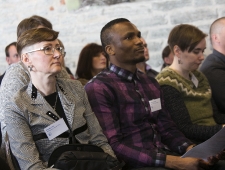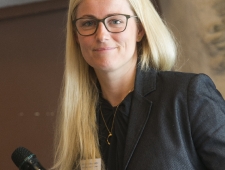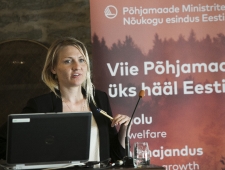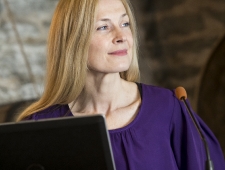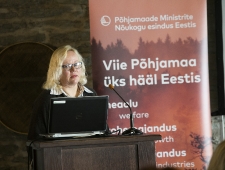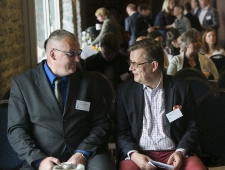The forum was opened by Rait Kuuse, Deputy Secretary General for Social Policy with the Ministry of Social Affairs, and Christer Haglund, director of the Nordic Council of Ministers’ Office in Estonia.
Adviser Kristiina Luht from the Ministry of Social Affairs gave a presentation entitled ‘Human Trafficking Victims and Their Stories’. She discussed human trafficking for sexual exploitation and the reality that all women, men, girls and boys face when they are used in the industry she called ‘adult entertainment’. She stressed that the demand behind human trafficking should be addressed. She said: “I do this because I have a voice, but the women and men who are victims of human trafficking cannot speak.”
In a session entitled ‘Identification of Victims in the Country of Destination and of Origin’, experts presented cases of how victims had been recruited (and after repatriation treated) in the country of origin, how the traffickers had exploited the victims and how the police and help systems in the country of destination had handled the case. The problems that arise when a victim disappears – what are the challenges faced by authorities and NGOs? – were also discussed in this session. Pia Marttila, the Coordinator of Assistance for Victims of Human Trafficking from Victim Support Finland, gave a presentation which focussed on the victims and discussed the challenge of providing services for victims of internal and cross-border trafficking.
A session entitled ‘Who Are the Victims of Human Trafficking?’ discussed human trafficking from non-EU countries to the EU. Police Superintendent Knut Bråttvik from KRIPOS in Norway talked about Nigerian trafficking in human beings and the ETUTU project of the European Multidisciplinary Platform against Criminal Threats (EMPACT). Social Worker Thomas Laigaard from the Centre against Human Trafficking in Denmark discussed African victims of human trafficking in his country. He said one challenge is that it is often based on migration, and the persons involved have often been on the road for several months before coming to Denmark, their investment in the trip has been great and to fall victim to human trafficking and other crimes is a high risk. For these people, returning to their home country is not an attractive option. The task of the social worker is to do something, and it is important to listen to and assist the victims so as to find the solution that is best for them.
In the third session, entitled ‘Victim Support Systems, Rehabilitation and Reintegration’, psychologist Roman Kõrlov from the NGO Eluliin in Estonia outlined the kind of help that is needed in order for victims to leave the human trafficking environment and prostitution. He stated that women who want to leave this environment say they wish to change their lives, to be normal, not to be afraid, etc. He stressed that it is crucial for those who wish to change their lives to leave the world of prostitution behind as soon as possible, because it is then easier to assist the victims. One of the challenges for social workers is how to change routines where spending money is concerned. Victims also need support networks. Kõrlov said that joint Nordic-Baltic human trafficking exit programmes should be developed.
Jari Kähkönen, Director of the Joutseno Reception Centre in Finland, showcased Finland’s national assistance system for victims: a state agency fully funded from the government budget. He said that the main wish of victims is to obtain justice and that the main task is to support them in returning to a normal social life. The national assistance system provides victims with subsistence and care, taking into account their special needs and requirements arising from their age, vulnerability and physical and mental state, as well as security considerations. It is also important to get a good lawyer for the victim so as to support them during legal proceedings.
Kristina Mišinienė, the Director of the NGO Caritas in Lithuania, described the help that NGOs can give victims, saying that NGOs around Europe offer more or less the same support to victims and that it is important that all NGOs assisting victims create a network and coordinate their efforts. Caritas has trained people to assist and support victims in court proceedings. The aim is for these support people to assist the victim during police investigations and court proceedings, to tell them why they should stand witness in court, to explain what information the police, prosecutor and court need and why they have to tell their story over and over again. Mišinienė ended by referring to Kristiina Luht’s opening address: “I think we all in future should be the voice of those who are silent.”
Some of the proposals made at the Expert Forum:
• More presentations on cases with a focus on the country of origin and country of destination
• Cross-border cooperation – common agreements and rules on cooperation so that victims get the help they need
• Create a Nordic-Baltic network of human trafficking exit groups
The expert forum was part of the three-year (2015-2018) programme of the Nordic Council of Ministers designed to combat human trafficking with the aim to implement tangible initiatives in Baltic Sea region to prevent trafficking, to prosecute traffickers and to protect and help victims.
See photo gallery of the forum in here:


